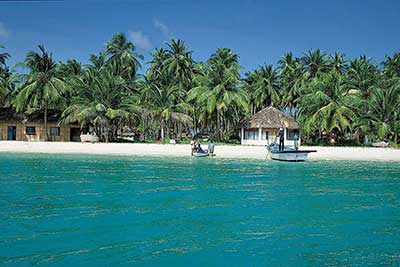Date: 02/01/2023
Relevance: GS-3: Role of External State and Non-state Actors in creating challenges to Internal Security, Linkages of Organized Crime with Terrorism
Key Phrases: Lakshadweep administration, Section 144, Parali 1 island, smuggling activities , narcotics, section 188, Lakshadweep Development Authority Regulation(LDAR) , 2021, Prevention of Anti-Social Activities Regulation, Animal Preservation Regulation, 2021,Lakshadweep Panchayat Regulations, 2021
Why in News?
- Recently, Lakshadweep administration has prohibited entry into 17 of the total 36 islands citing national security and public safety concerns.
- There are 17 uninhabited islands and permission for the entry from the sub-divisional magistrate is required.
- The District Magistrate (DM) of Lakshadweep issued a proclamation under Section 144 of the Criminal Procedure Code (CrPC) to prohibit entry.
Do you know about Lakshadweep?
- Lakshadweep is a tropical archipelago of 36 atolls and coral reefs in the Laccadive Sea, 280 km to 480 km off the coast of Kerala.
- Currently, there are 35 islands, as the Parali 1 island is submerged in water due to sea erosion.
- Lakshadweep means "one lakh islands" in Malayalam, the official as well as the widely spoken native language in the territory.
- Fishing is the most important industry.
- The islands form the smallest union territory of India and their total surface area is just 32 km square.
- Kavaratti serves as the capital of the Union Territory and the region comes under the jurisdiction of Kerala High Court.
- It is a uni-district Union Territory.
- These islands were earlier known as Laccadive, Minicoy, and Amindivi Islands.
- The name Lakshadweep was adopted on 1st November 1973.
What are the reasons articulated for prohibition of entry in 17 uninhabited isles?
- Prevent terrorist or smuggling activities:
- The decision on the proclamation was taken to prevent terrorist or smuggling activities on the uninhabited Islands.
- These activities can be carried out under the temporary structures as houses of labourers who harvest coconuts.
- Increasing number of illegal, anti-social and anti-national
activities:
- The Lakshadweep administration said there are intelligence reports of some people involved in illegal, anti-social and anti-national activities.
- Terrorists seeking shelter or hideout for hiding weapons or
narcotics:
- There are temporary structures on some uninhabited islands for the purpose of housing labourers to harvest coconuts.
- This cannot be ruled out that along with these labourers there are persons who engage in illegal, anti-social and anti-national activities such as smuggling, seeking shelter or hideout for hiding weapons or narcotics.
- Possibility of terror groups vandalising key national institutions:
- Evidence of terror groups or organisations planning to attack and vandalize important and key institutions of the country and crowded places.
- Precautionary measures are necessary to dismantle any such unholy plans.
- Lakshadweep administration warned violators of punishment under section 188 (disobedience to order duly promulgated by public servant) of the IPC which provides for a jail-term between one and six months or a fine.
What are the other recent regulations formulated by the Lakshadweep administration?
- The Lakshadweep Development Authority Regulation(LDAR) , 2021:
- LDAR led to the creation of a Lakshadweep Development Authority (LDA).
- The regulation defines development as the carrying out of the building, engineering, mining, quarrying, or other operations in, on, over, or under the land.
- The Lakshadweep Development Authority could acquire any land required for a public purpose.
- LDAR stipulates that islanders must pay a processing fee for zone changes.
- LDAR establishes penalties such as imprisonment for obstructing the development work or workers.
- The Prevention of Anti-Social Activities Regulation (PASA):
- PASA provides for the administrator to order the detention of a person for a period of up to one year.
- It can be ordered if the offender’s actions adversely affect the maintenance of public order.
- Such actions include when a person is a bootlegger, drug offender, immoral traffic offender, property grabber, etc.
- All these actions are deemed to adversely affect the maintenance of public order.
- The Animal Preservation Regulation, 2021:
- Regulation bans the slaughter of cows, calves, bulls, or bullocks.
- The slaughter of animals, other than cows or bulls, for religious purposes, will require a certificate from the authorities.
- The Lakshadweep Panchayat Regulations, 2021:
- It disqualifies people with more than two children from becoming gram panchayat members.
- However, the law will not disqualify anyone having more than two children if they have been elected before the regulation has been notified.
- The regulation also provides for the reservation of 50 percent seats in gram panchayats for women.
Conclusion:
- Such regulations are vital to prevent fear and terror among the people through terrorism, violence and the possibility of anti-national, smuggling, illegal and anti-social activities.
- Such regulations proactively prevent attacks on important military and para-military, industrial and religious places of the country, endangering public safety.
Source: The Hindu
Mains Question
Q. Security occupies a very central role in the administration of the Lakshadweep. Discuss. Also, highlight the various measures taken by the Lakshadweep administration to address them.( 15 marks).






















